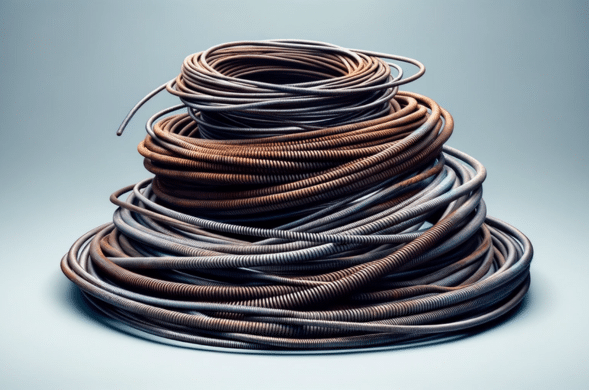The sweet harmonies of a well-tuned electric guitar are nothing short of magic! But, as any guitarist would know, rust on the strings can quickly turn a dreamy melody into a rather unpleasant nightmare! That’s where this guide on “How To Prevent Electric Guitar Strings From Rusting” comes to the rescue.
We’ll dive into the whimsical yet practical world of rust prevention, ensuring your strings remain as melodious as your musical heart desires. This isn’t just a guide; it’s your guitar’s newfound buddy in its battle against the rust monster, armed with amusing anecdotes and sage advice to keep the tunes flowing rust-free.
Let’s have a look, shall we?
The Short Answer
Prevent your guitar strings from rusting by wiping them down after each time you play to remove sweat and oils. Store your guitar in a dry, temperature-controlled environment to keep moisture at bay. Consider investing in coated strings, which have a protective layer to ward off rust. Have a can of string cleaner and a cloth on hand for a quick rust clean-up if you’re playing in humid places.
Keep On Reading (Below) To Learn More
Preventing Rust: A Step By Step Guide

The journey towards rust-free strings isn’t laden with hardships. It’s more of a casual stroll than a steep hike. Here are five simple things you can do to keep your strings rust-free.
Wash Your Hands!
The first rule of thumb is to never play your guitar with dirty hands!
Before you dive into the strings, a simple act of washing your hands can be the first line of defense against rust. Clean hands deposit less oil and grime, making each session a little kinder on your strings. It’s the equivalent of taking off your shoes before entering someone’s house – a small courtesy with big implications!
Keeping Your Strings Clean And Dry
A simple wipe-down with a clean, dry cloth post-jam session goes a long way. It takes a mere minute but grants your strings a longer, rust-free existence. Think of it as tucking your guitar into bed after a long day of rocking out.
When you clean your strings, be sure to clean underneath, where you’ll find loads of grime and filth, making your guitar its home!
Regular String Changing
Let’s not overlook the simple act of regular string changing. It’s like giving your guitar a fresh breath of life, ready to serenade the world with rust-free tunes.
Typically, the timeline for changing strings varies with the usage, but a general guideline is to switch them out every 3 to 6 months, depending on how much you play and how much your hands sweat.
Using String Protectants
String protectants are the unsung heroes of rust-free strings. A gentle application post-cleaning creates a protective sheen that locks out moisture and dirt. It’s a small step with a big payoff, ensuring each chord resonates with clarity. It’s like applying a good sunscreen before hitting the beach; only this sunscreen protects against rust, not sunburn!
The Role Of Coated Strings
In the grand scheme of preventing rust, coated strings are your trusty allies. They come with a thin layer of protective coating that acts as a barrier against the moisture and oils from your fingers. It’s like providing your strings with a snug little raincoat to ward off the rust-inducing elements. And who doesn’t love a good raincoat on a drizzly day?
Comparative Analysis of Coated vs Uncoated Strings
| Features | Coated Strings | Uncoated Strings |
|---|---|---|
| Rust Resistance | High | Low |
| Tone Longevity | Longer | Shorter |
| Cost | More Expensive | Less Expensive |
| Feel | Smoother | Rougher |
| Sound | Warmer, less natural | Brighter, more natural |
| Noise | Help reduce finger noise | Noisier than coated strings |
Do Strings Stay Rust-Free In Their Package?

Who doesn’t like a fresh, unopened package of guitar strings that holds promises of countless melodious adventures? But do these strings enjoy eternal immunity from rust?
Well, although they are not totally immune, guitar strings are much safer from the rust menace while in their package, especially if they are in an air-tight environment.
The sealed environment keeps the treacherous moisture and air at bay, preserving the strings’ gleaming demeanor.
However, once the seal is broken, the strings are now at the mercy of the elements, and it’s a wild, wild world of rust monsters out there! But fret not; armed with the knowledge from this guide, you’ll be well on your way to keeping those strings shining, come rain or shine.
The Benefits Of Rust-Free Strings
The quest for rust-free strings isn’t just a whimsical pursuit but a practical endeavor that resonates with every strum, keeping the musical spirit vibrant and the tunes flowing effortlessly.
Prolonged String Life
Preventing rust is akin to gifting your strings a fountain of youth. The less rust they encounter, the longer they maintain their tonal integrity. It’s a symbiotic relationship; you nurture them, and they, in turn, provide the sweet, melodious tunes that are the essence of your musical expression. It’s like having a heart-to-heart with your strings and promising them a good, long life.
Consistent Sound Quality
Rust is to guitar strings what kryptonite is to Superman. It gradually saps away the vibrant tone, leaving behind a dull, lifeless sound. Maintaining a rust-free environment ensures that the brilliant, crisp sound of your guitar remains unadulterated, ready to enchant the audience every time your fingers dance on the fretboard.
Smooth Playability
There’s a kind of magic in the smooth glide of fingers over pristine strings. Rust-free strings offer a seamless playability, making every practice session or performance a delightful experience.
The absence of rust also means your fingers meet less resistance, allowing for a fluid movement that translates into a captivating musical flow.
It’s like gliding on a freshly zambonied ice rink, smooth and utterly satisfying.
What Is Rust?
Let’s have a quick rendezvous with the culprit, shall we? Rust is like that uninvited guest at a party who overstays their welcome.
It’s the result of a chemical reaction where iron (present in steel strings) fraternizes with oxygen in the presence of moisture. They mingle, bond, and voila! Rust is born, gatecrashing our guitar strings’ party.
While guitar strings can rust, they’re actually more likely to tarnish.
Now, let’s explore how to show rust the exit door.
Understanding The Enemy: What Causes String Rust?
A guitar string’s worst enemy is often the musician’s best friend – our fingers. Yes, the very tips that move along the strings, creating music, also carry the seeds of rust and corrosion. It’s a classic tale of love and betrayal, right on the fretboard!
Moisture And Your Strings
Every touch on the string leaves behind a tiny residue of sweat, oils, and, sometimes, remnants of that delicious burger you had for lunch. The moisture from sweat is particularly nefarious, providing a breeding ground for rust.
Over time, this moisture breaks down the outer layer of the strings, allowing rust to take hold. It’s like inviting a vampire into your house; once inside, it’s thirsty for more!
Other Contributing Factors
It’s not just our fingers at play here. The ambient humidity in the room, the salty breeze if you’re jamming near the beach, or even the soda fizz in the air at a bar gig, all contribute to the rusting process.
String Rust Versus Tarnish: A Tale of Two Culprits
In the world of guitar maintenance, both rust and tarnish are unwelcome guests that can dull the gleam and tone of your beloved strings. Though they appear to be similar foes, they hail from different origins and impact your strings in unique ways. Let’s delve into the distinctions and preventive measures for each.
Both rust and tarnish are preventable with a bit of care and attention to your guitar and its strings. Incorporating these preventive measures into your guitar maintenance routine can ensure that your strings remain vibrant and harmonious, ready to serenade the world with each strum.
The Rusty Encounter
Rust is a form of iron oxide that occurs when steel or iron reacts with oxygen and moisture. Since most guitar strings have a core of steel, they are susceptible to rusting when exposed to humid or damp conditions. Rust not only affects the aesthetic appeal of your strings but significantly dampens their sound quality and playability.
Preventing rust requires a bit of diligence and care:
- Wipe Down: A simple yet effective routine of wiping down your strings after each play can keep moisture at bay.
- Use Coated Strings: Coated strings have a protective layer that resists rust, making them a worthy investment for longevity.
- Store Properly: Keeping your guitar in a dry, temperature-controlled environment can significantly minimize rusting chances.
The Tarnish Tale
Tarnish, on the other hand, is a thin layer of corrosion that forms over metals like nickel or silver, which are often used in winding guitar strings. Unlike rust, tarnish doesn’t eat away at the metal but instead forms a protective layer. However, tarnish can affect the string’s vibrancy and tone.
Thwarting tarnish requires a similar tune of prevention:
- Regular Cleaning: Regular cleaning with a soft cloth can help prevent tarnish build-up.
- Anti-Tarnish Products: There are specific products available that can help keep tarnish at bay.
- Proper Storage: Again, storing your guitar in a controlled environment can be a key player in preventing tarnish.
My Personal Experience: When Rust Joined The Show!
One night, I had a show at a small, cozy club. The room was buzzing with excitement as I tuned my guitar, ready to share my music. But as I strummed the first chord, something sounded off. The notes didn’t ring clear and bright as they usually did. They sounded dull. A quick look revealed tiny spots of rust on my strings. Oh no!
The damp air in the clubs I usually play had invited rust onto my strings. The rough, rusty strings made my guitar sound bad, and each note I played sounded less lively. I knew I had to fix it fast; the audience was waiting for a good show!
Then I remembered I had packed a small can of string cleaner and a soft cloth in my gig bag. It was time for a quick cleanup! I sprayed the cleaner on the cloth and gently wiped down each string. The cloth picked up the rust, and soon, my strings were shining again. They felt smooth under my fingers, ready to sing loud and clear.
The next strum was magic! The room filled with the bright, happy sound of my guitar. The music danced through the club, and everyone started tapping their feet to the rhythm.
That rust-busting encounter taught me a handy lesson. Always check your strings before a show, especially when playing in damp places. A quick wipe with a clean cloth can keep rust away and your guitar sounding great. And oh, having a can of string cleaner in your bag is like having a magic rust-away spray for your strings!
Wrapping Up: The Road To Rust-Free Strings
As we strum the final chords of this guide on How To Prevent Electric Guitar Strings From Rusting, the melody of prevention rings through. The steps to keep those strings rust-free are not just about maintenance, but a tribute to the beautiful artistry that is music. By following the simple yet effective measures outlined, you’re not just extending the life and quality of your strings but paying homage to the timeless tunes awaiting your fingertips.
It’s the small acts of care, a gentle wipe here, a timely string change there, that build a lasting, harmonious relationship between you and your guitar. A rust-free string is a passport to a realm where melodies flow freely, unencumbered by the gritty grasp of rust. It’s like handing over the keys to the musical kingdom to your guitar, where each strum resonates with the sweet sound of purity.
So, with a heart brimming with tunes and a guitar unshackled by rust, the world is indeed your musical oyster. Go ahead, strum those rust-free strings, and let the melody of prevention play the sweetest tune, echoing through the corridors of your musical journey!

Check out this short video from D’Addario on basic guitar maintenance.
What To Read Next ➡ Why Change Guitar Strings? – Tips To Play And Sound Awesome!
Related Article ➡ How Can Guitar Strings Be Recycled? – Riffing Responsibly!
Please Tell Me What You Think!
Your experiences, insights, and adventures in the world of guitar strings are a treasure trove waiting to be shared. Dive into the comments section and share your tales, tips, or even the challenges you’ve faced with rusty strings.
- What brand of guitar strings do you use?
- How often do you change your guitar strings?
- What do you do to make your strings last longer?
- What else is on your mind?
I’m happy to answer any questions you might have!
Frequently Asked Questions
Here are some of the questions I get asked about guitar strings.
If your question does not appear here, please put it in the comments, and I will get right back to you with an answer.
How Do I Know If My Guitar Strings Are Good?
Good guitar strings should provide a clear, bright, and rich sound, and feel smooth to the touch. If they exhibit signs of rust, feel gritty, or if you are constantly needing to retune your guitar, it’s likely time for a replacement. The overall sound quality, feel, and tuning stability are key indicators of the condition and quality of your guitar strings.
Do Guitar Strings Go Bad Without Playing?
Yes, guitar strings can go bad even without playing. Over time, they can be subjected to oxidation, humidity, and temperature changes in the environment, which can lead to corrosion or rust. Even if stored properly, the material of the strings can degrade over a long period, affecting their tone and playability once they are eventually used.
How Long Do Cheap Guitar Strings Last?
The lifespan of cheap guitar strings can vary significantly based on several factors, including the material, the environment in which they are stored and used, and the frequency of play. Generally, cheap strings may start to lose their tonal quality and become more prone to breakage or rust within a few weeks to a couple of months of regular play.
However, with proper care, such as wiping them down after use to remove oils and sweat, and storing the guitar in a dry, temperature-controlled environment, you may be able to extend their usability a bit longer.
How Do You Remove Rust From A Guitar String?
Removing rust from guitar strings can be a bit of a delicate operation. You can lightly sand the rusted areas with fine steel wool or use a rust remover product, being careful not to damage the string further.
However, it’s important to note that once a string has rusted, its tonal quality and playability have likely been compromised, and replacing it might be the better and more cost-effective solution in the long run.
How Long Does It Take For Strings To Rust?
The rate at which guitar strings rust can vary widely based on several factors, including the material of the strings, the environment in which they are kept, and the usage they undergo. Typically, strings may start to show signs of rust or oxidation as early as a few days to a week in humid or salty air conditions, especially if they are played frequently and not properly wiped down after use. However, with good care and in a controlled environment, strings can remain rust-free for several months.



Hey Susie
Thanks for the article; it was very informative and helped me understand why my guitar strings keep rusting. I’ll definitely start cleaning them more often and maybe invest in some coated strings.
I remember a time when I was playing at an outdoor gig, and the humidity was insane. Halfway through the set, my strings felt like they were covered in some invisible gunk, and the sound just wasn’t the same. I wish I had known about the importance of keeping them clean back then. Your article would’ve saved me from that rusty situation!
Hi Matias
Thanks for the comments!
Yeah, coated strings are a way to go, but you might not like the sound, which tends to be warmer.
It’s best to carry a bottle of string cleaner and a microfiber cloth in your guitar case if you like the way your current brand of strings sound and play. I also recommend putting on a new string every 3 to 6 months, depending on how much you play.
Keep Rockin’ It!
Susie
Hi Susie, thanks for this informative and surprisingly entertaining article. I was so surprised when I started to get rust on my fingers from my guitar strings. I really did not know this could happen. I really appreciate these tips, because I find restringing my guitar a really fiddly process and the less often I have to do it the better.
Hi Michelle
Yeah, keeping those strings clean is key! I definitely recommend wiping them down after each playing session, especially if you gig in smoking places!
A bottle of string cleaner and a microfiber cloth will do wonders!
Watch a few YouTube videos on how to change strings the “easy way.” Having a string winder is a must, and they’re pretty cheap!
Keep Havin’ Fun With Your Guitar!
Susie